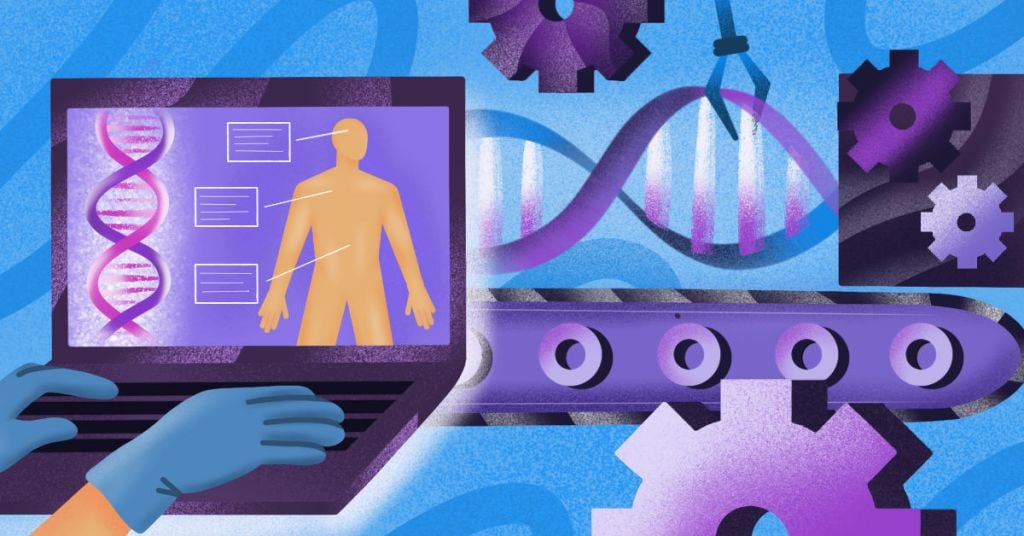Newsletter Signup - Under Article / In Page
"*" indicates required fields
As big pharma companies flock to drug discovery collaborations with artificial intelligence (AI) firms, the French giant Sanofi has sealed a €4.6B deal with the UK AI player Exscientia to develop oncology and immunology treatments.
According to the deal’s terms, the partners will develop up to 15 small molecule drugs to treat cancer and immunological conditions. Exscientia will lead the discovery of disease targets and the design of small molecule candidates, and Sanofi will take over from preclinical development onwards. Exscientia expects to receive €88M ($100M) upfront in addition to developmental milestone payments worth up to €4.6B ($5.2B).
“Our collaboration with Sanofi is one of the largest deals to apply AI across a large pharma pipeline,” said Andrew Hopkins, CEO and founder of Exscientia. “I think the scale of this deal illustrates how the industry is moving to embrace an AI-led approach to modernize and fundamentally improve the way new medicines are created.”
This isn’t the first time Sanofi and Exscientia have worked together; the firms sealed a €250M licensing deal in 2017. This earlier agreement focused on the discovery of bispecific small molecule drugs for metabolic diseases, with Sanofi in-licensing one of the candidates in 2019.
As part of the new deal, Exscientia will screen patient tissue data with the help of artificial intelligence in order to predict which drug candidates will perform best in clinical settings. According to the company, this strategy could speed up the drug development process by including patient and clinical data earlier than in traditional drug discovery.
“Our expanded collaboration with Sanofi will utilize the breadth of our platform to test AI-designed drug candidates against patient tissue models, potentially providing far better accuracy than conventional approaches such as mouse models,” said Hopkins in a public statement. “When you consider the change this represents – testing candidates against actual human tissue years before a clinical trial – it’s transformative.”
Exscientia is one of the leading players in AI-guided drug discovery. Alongside its multi-billion-euro collaboration with Sanofi, the firm raised an impressive €442.1M in an initial public offering (IPO) on the Nasdaq and accompanying private placement in October 2021. The firm has many drug development collaborations ongoing, including with Evotec, Bristol-Myers Squibb, Bayer, and the Bill and Melinda Gates Foundation.
Exscientia isn’t the only AI drug discovery firm to be picked up by big pharma companies in the last year. Eli Lilly recruited the Israeli specialist Biolojic Design in March to use AI in the development of bispecific antibodies. Other examples include AstraZeneca signing on with BenevolentAI in the UK, UCB with Microsoft, Sanofi with the US-French firm Owkin, and MSD with Evaxion Biotech in Denmark.
According to a Twitter post by Lenny Van Steenhuyse, Associate Director of Corporate Finance Life Sciences at the Belgian investment bank KBC Securities, we may start to see a fear of missing out, leading more big pharma companies to join the AI drug discovery gold rush.
“We’re in a phase where big pharma is kicking the tires of these AI approaches to see what can be truly valuable, getting familiar with what’s around in the marketplace and what speaks to them,” Van Steenhuyse told me.
“It’s clear that at least some of these tools will be here to stay, and, as always, the promise of truly transformational novel technologies triggers an arms race within big pharma where no one wants to be the last one realizing a major shift is happening.”
In spite of the growing excitement around the use of AI in drug discovery, the approach has yet to be validated by taking a drug to regulatory approval.
Exscientia is one of the firms closest to this milestone. Three of its AI-designed drugs are in phase I trials, including a treatment for obsessive-compulsive disorder. Results from one of the trials, testing an immuno-oncology drug, are expected by early 2022.
“In the end, this validation will only be established when these tools increase the likelihood of a drug reaching the market, which will take a long time,” said Van Steenhuyse.
Exscientia is also testing its technology in an ongoing clinical trial where the company screens blood cancer cells from patients and uses AI to predict which existing drugs would best treat the cancer. According to preliminary results released in 2020, 30 of 56 (54%) participants taking medications recommended by AI saw the cancer progression slow for longer than with their previous treatments.
“That use of our technology was applied to guide treatment using previously existing therapies,” said Hopkins. “Imagine if we are also able to design fundamentally better targeted, higher quality treatments from the beginning.”
“It’s my hope that within the next 10 years, all medicines are created using AI because that’s going to ultimately benefit patients who are in need of better treatment options.”
Cover image via Anastasiia Slynko
The power of AI in antibody discovery






